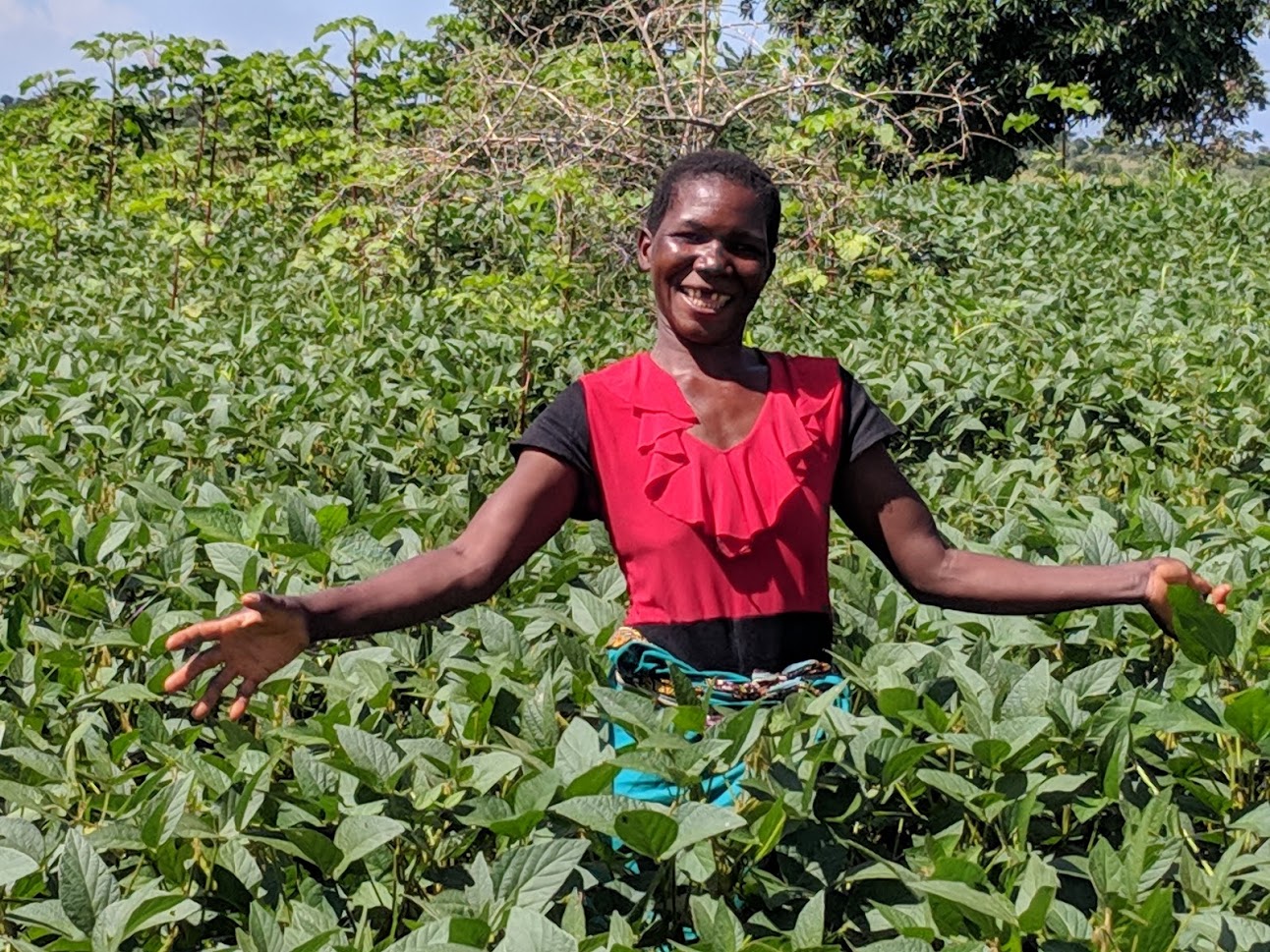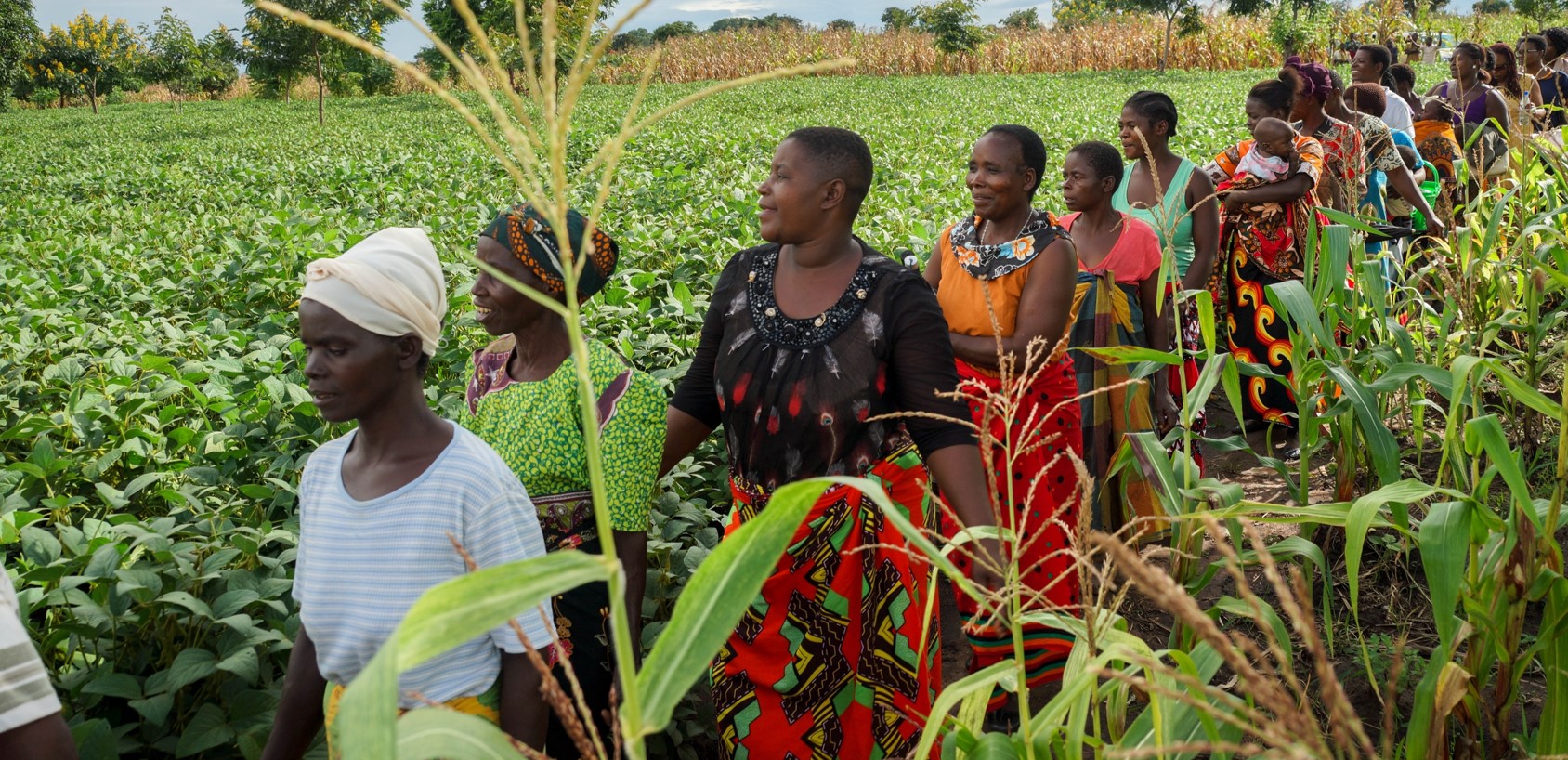
About the Together Women Rise Grants Program
Together Women Rise’s Grants Program has two key components that support our overall mission to achieve global gender equality:
- Featured Grants
- Transformation Partnerships
Featured Grants are largely focused on delivering direct services to women and girls by funding grassroots organizations that empower and support women and girls in low-income and marginalized countries around the world. Some examples include funding organizations that provide scholarships for women and girls to attend school, or that improve access to healthcare in remote areas where this care is nonexistent or limited.
Transformation Partnerships are designed to invest in areas where we can make the biggest impact on achieving global gender equality by addressing the root causes of gender inequality.
The fact is that we cannot reach gender equality by funding direct services alone. The inequality is too deeply rooted in social and cultural norms, beliefs, practices, and laws. We must address these root causes of inequality and the systems that hold women back and prevent them from having equal access to opportunities, resources, and decision-making power.
Together Women Rise knows that both approaches are crucial to achieving global gender equality — funding direct services through our Featured Grants and funding “systems change” through our Transformation Partnerships.
Did you know…The World Economic Forum reports that at the current rate of progress, it will take 131 years to reach full parity. UN Women reports that it may take another 286 years to remove discriminatory laws and close prevailing gaps in legal protection for women and girls. |
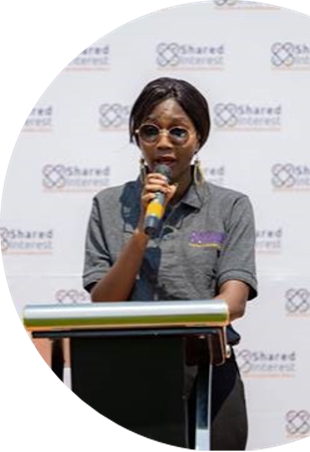 Our First Transformation Partnership
Our First Transformation Partnership
We awarded our first Transformation Partnership in 2022 to Shared Interest, an organization that we previously funded with a Featured Grant in 2020. Our Featured Grant helped to provide women entrepreneurs and farmers with high-quality, climate resistant seeds to improve their productivity, household nutrition and incomes. It also helped make women “bankable” so they could receive bank loans to help their businesses succeed.
Our Transformation Partnership with Shared Interest involves a $39,500 Planning Grant to help identify the most impactful ways to drive change in the banking system in Malawi in order to achieve economic equality for women entrepreneurs.
A Global Issue: Women’s Access to Financial Resources & Services
According to Women’s World Banking:
- Nearly one billion women around the world are unserved or underserved by the formal financial sector and unable to reach their full economic potential.
- If women participated equally, $12 trillion could be added to global annual GDP by 2025.
- Millions of women in developing countries are micro-entrepreneurs, and that number is growing. Yet, 70% of women entrepreneurs report inadequate access to the capital necessary to grow their businesses.
- In Africa, women receive less than 3% of start-up financing.
Here in the US …It was not until 1974 and the passage of the Equal Credit Opportunity Act that women were allowed to open bank accounts, apply for credit and commit to a mortgage without needing a male co-signer. |
About Malawi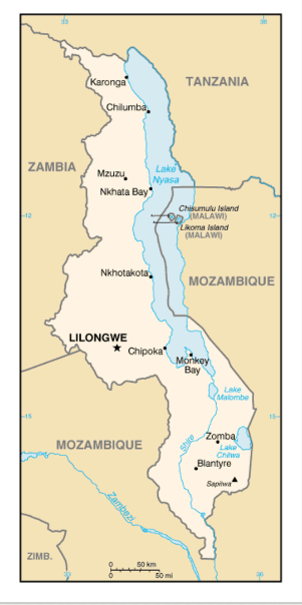
- Located in Southern Africa, Malawi is landlocked, sharing its borders with Mozambique, Zambia, and Tanzania.
- The country’s estimated population of 19.65 million (2021) is expected to double by 2038.
- Malawi remains one of the poorest countries in the world despite making significant economic and structural reforms to sustain economic growth.
- High fertility rates, despite substantial recent progress, have left the country with one of the youngest age structures in the world: 43 percent of the population are under the age of 15 and over 75 percent are under the age of 34.
- The economy is heavily dependent on agriculture, which employs over 80% of the population, and it is vulnerable to external shocks, particularly climatic shocks.
- Malawi is currently reeling from the effects of Cyclone Freddy, which took place in February/March 2023 and has claimed over 500 lives, displaced over 500 people, infrastructure and property.
Malawi’s Economic Context for Women Entrepreneurs
- Despite the fact that the government of Malawi has committed to addressing gender inequality and improving women’s wellbeing, the country ranks 110 out of 146 on the World Economic Forum’s 2023 Global Gender Gap Index.
- One of the key drivers that contribute to Malawi’s gender gap is women’s lower levels of financial inclusion compared to men. This includes women’s lower earnings, their lower access to key sources of collateral, such as land, and a lack of financial products that are specifically targeted at women. (World Bank’s Malawi Gender Assessment)
- High collateral requirements by commercial banks deter borrowing by micro, small, and medium-sized enterprises (MSMEs), especially women, resulting in heavy reliance on savings and informal sources to fund investments (Ndala and Moto 2019).
- 10% of medium enterprises, 5% of small enterprises, and 3% of micro-enterprises accessed credit from commercial banks (Finmark Trust, 2019a).
- High-interest rates, collateral requirements, and complex application procedures are usually given as the main reasons by businesses for the low uptake of loans by MSMEs (Finmark Trust, 2019).
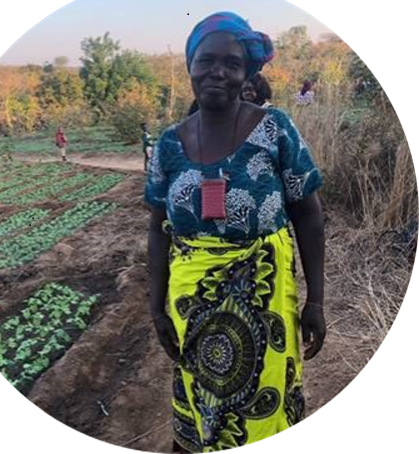 About Shared Interest
About Shared Interest
Shared Interest was founded in 1994 as a nonprofit investment fund that grew out of the anti-apartheid movement. The goal was to encourage local banks to lend to low-income Black women entrepreneurs and other small and medium-sized enterprises that are critical engines of economic development in Southern Africa. To date, Shared Interest has provided $34 million in loan guarantees, which have unlocked $131 million in local capital for small and medium-sized enterprises, ultimately benefitting more than 2.3 million individuals from Black and economically disenfranchised communities in South Africa, Malawi, Zambia, Eswatini and Mozambique.
Shared Interest engages with financial institutions whose practices reflect a legacy of colonialism, extraction, and exclusion, to change how they lend and service women entrepreneurs. Its latest business model is designed to reach 100,000 Southern African beneficiaries – 60 percent of whom are women and youth – and to partner with 10 financial institutions to unlock local capital and resources for Black-owned small and growing businesses.
Shared Interest’s Approach
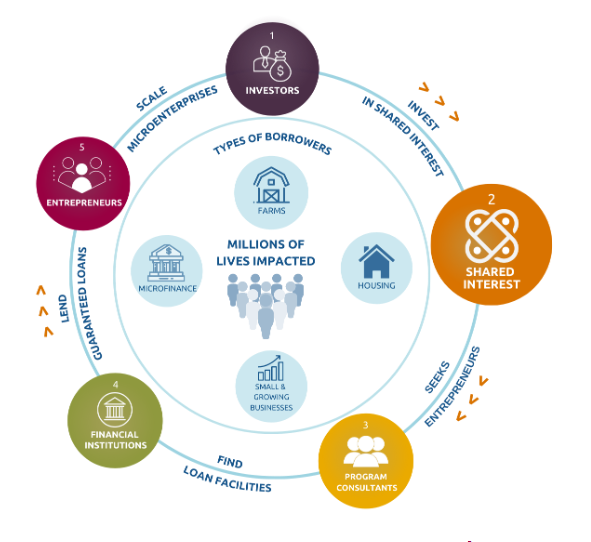 Shared Interest has a simple 5-step approach:
Shared Interest has a simple 5-step approach:
- Investors invest in Shared Interest to empower women entrepreneurs
- Shared Interest seeks and vets women entrepreneurs
- Shared Interest partners with women entrepreneurs to identify an appropriate lender for their business
- Shared Interest supports entrepreneurs by negotiating the best terms and providing a guarantee using the capital borrowed from their investors
- Women entrepreneurs use the funds to serve their communities, create new jobs, scale their businesses, and repay their loans.
Shared Interest is also championing reforms that would revolutionize the way that financial institutions do business. It starts with addressing biases and misconceptions among bank staff and leadership that have resulted in negative experiences for women in the past. Then, it works to re-shape the approach and products offered by lenders so that future interactions will be positive, successful, and on an even footing with men.
For example, the way banks currently do business is unsuited to the realities of women’s lives. Most branches are in urban centers, and many women are unable to travel to these locations due to logistics and social norms. Loan applications include burdensome documentation requirements that many women are unable to satisfy. Shared Interest works with lenders to refine their policies and thereby lower barriers for women.
Common Biases & Misconceptions in Africa
|
Key Recommendations from Planning Grant
- Drive adoption of Movable Collateral Registries.
MCRs enable women to use assets other than real property – such as motor vehicles, livestock, crops, maize mill, or equipment – to get a loan. The collateral registry is an online public database that allows financial institutions to register security interests in movable property and mitigate the risk of customers. Despite the laws and policies that allow women to use MCRs, there is low usage of MCRs by women. The goal is to increase usage to gender parity by transforming attitudes and practices to eliminate the gender bias inherent in banks’ current collateral and lending practices. - Implement borrower-driven changes to lender policies and products by helping lenders realize that by perpetuating exclusion of women through systems, products, and services that create barriers and reinforce harmful gender norms, they are neglecting a valuable market opportunity. Encouraging them to create new processes and design new offerings that reflect women’s needs and preferences can improve women’s accessibility to financial services and revenue generation for the financial institutions.
Voices
- “Movable asset registries from our experience with smallholder farmers are very difficult to use, especially because of the type of assets smallholder farmers have. Just imagine a goat or a cow: how do you register this in terms of identification?”
Representative of Community Finance Limited - “There is a need for collaboration with a lot of stakeholders, including the insurance industry, the government, specifically looking at rural traffic [systems]. Another issue is registrations fees, these fees should be a little bit lower for SMEs.”
Representative of FDH Bank (commercial bank in Malawi) - “When they look for collateral [the banks] have designated areas. If a woman has a house in a remote or rural area that is not in a designated area, the banks will not give you a loan.”
Executive Director of National Association of Business Women-Malawi.
